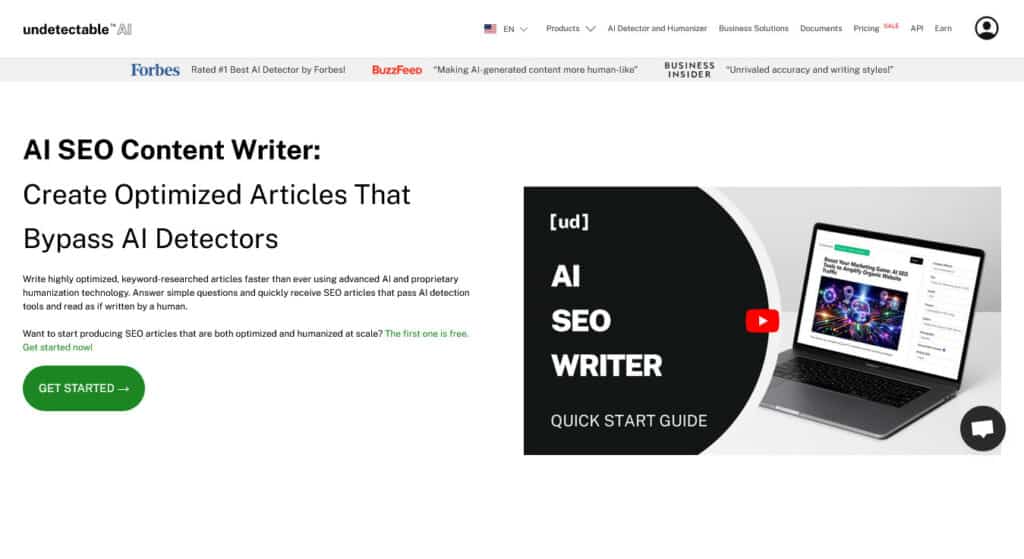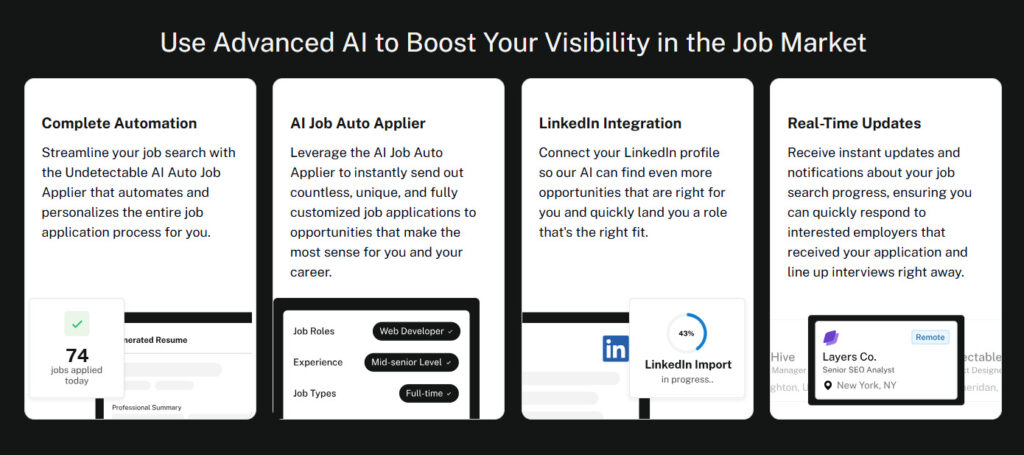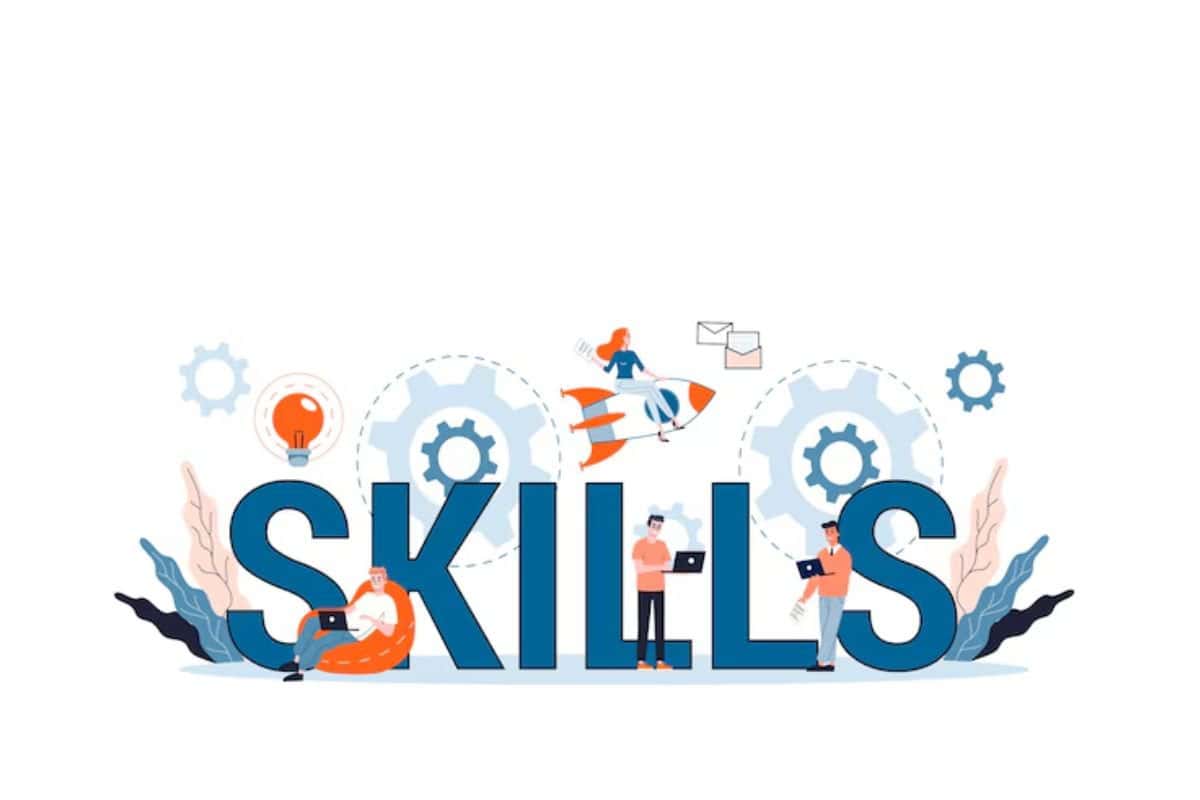Why do some resumes get callbacks while others get ignored?
Because the best ones highlight the right skills to put on resume in a way that catches a recruiter’s attention.
But what exactly should you include? And how do you present your skills in a catchy way?
In this guide, you’ll explore the best hard and soft skills to put on a resume, where to list them, and how to optimize them for ATS and recruiters.
Let’s start with the basics, why does the resume Skills section matter?
How Resume Skills Impact Hiring Decisions
When hiring managers scan resumes, their center of attention is the skills section, hard and soft both.
Skills determine whether you have what it takes to handle the job, and in many cases, they make or break your chances of getting an interview.
Filtering resumes by skills is the quickest way for employers to sort through hundreds of applications.


Never Worry About AI Detecting Your Texts Again. Undetectable AI Can Help You:
- Make your AI assisted writing appear human-like.
- Bypass all major AI detection tools with just one click.
- Use AI safely and confidently in school and work.
This means that your chances of surviving this filtering phase highly depend on what skills you’ve put on the resume.
Many employers now automate this phase using the Applicant Tracking System (ATS).
The Role of Skills in Applicant Tracking Systems (ATS)
Before your resume reaches human eyes, it often has to pass through an Applicant Tracking System (ATS).
These systems scan and rank resumes based on keywords, including specific skills.
Their purpose is to weed out applicants who don’t meet the job’s basic criteria.
Some systems look for exact matches, while others assign scores based on how many relevant skills appear in your resume.
So if your resume lacks the right skill-based keywords, the system can automatically reject it, even if you’re technically qualified.
This is why you should have the job description’s language in mind while figuring out skills to put on resume.
In other words, your resume should speak the same language as the job posting.
Hard Skills vs. Soft Skills: What’s the Difference?

There’s a distinction between required and preferred skills.
Required skills are non-negotiable by value and technical and measurable in nature. We call them hard skills.
Preferred skills, on the other hand, are nice to have but not dealbreakers. And these are soft skills.
Let’s define each one of them.
- Hard skills are the concrete, teachable abilities that you gain through formal education, training, or experience. Coding, accounting, foreign languages, graphic design, and more are all things you can quantify and prove. These skills are often job-specific and play a major role in determining your qualifications.
- Soft skills, on the other hand, are behavioral traits and interpersonal abilities that influence how you work. Communication, leadership, adaptability, and time management all fall under this category. Unlike hard skills, they’re harder to measure but just as crucial, sometimes even more so in client-facing or leadership roles.
Most employers look for a balance between both.
You could be the best software engineer in the room, but if you struggle with teamwork or problem-solving, you might not be the right fit.
How to Choose the Best Skills for Your Resume
Mindlessly listing every skill you have isn’t going to land you in front of a hiring manager.
Instead, you only need the few best skills to put on resume for the job you’re targeting.
Here’s how to choose what skills to put on resume.
Analyzing the Job Description for Required Skills
The first step is to read the job posting carefully and identify both the hard and soft skills they mention.
For instance, if the role requires “customer service experience” and “proficiency in CRM software,” you need to list the skills that prove you fulfill these requirements.
You may also use the same wording as the job description.
Many industries rely on buzzwords, and mirroring these terms makes your resume more ATS-friendly.
Customizing Your Skills Section for Each Job Application
Employers want to see a skills section that closely matches their role, not a catch-all list.
So avoid applying for jobs—even within the same industry—without customizing your resume for each role.
If you’re applying for a marketing manager role at one company and a digital strategist role at another, the core skills might overlap, but the emphasis could be different.
One might prioritize social media analytics, while the other focuses on paid advertising.
Balancing Hard Skills, Soft Skills, and Technical Skills
How many skills should you list? And how do you find the right mix? That depends on the job.
Here’s a basic rule of thumb to stick to:
- For technical roles like software development or data analysis, hard skills and technical skills should dominate.
- For roles involving teamwork, leadership, or communication such as sales, project management, or customer service, soft skills carry more weight.
At the end of the day, there should be a healthy mix of both types of skills.

To build a digital presence that validates your expertise beyond a single document, you can use our AI SEO Writer to help you draft SEO articles that effectively highlight and explain your most marketable professional skills.
Publishing detailed guides or case studies on your own blog creates a searchable trail of your knowledge, proving to recruiters that you are a subject matter expert rather than just an applicant.
Top Hard Skills to Put on a Resume
Hard skills play a bigger role in proving your expertise.
Your resume becomes stronger the more relevant hard skills you highlight.
Here are some example hard skills to put on a resume based on different skill categories.

Computer Skills
Most jobs today require interacting with computers in one way or another.
So having a solid grip on a relevant computer skill is nice to have.
But if you’re applying for an IT position, certain computer skills become a must-have.
- Microsoft Office Suite (Excel, Word, PowerPoint)
- Google Workspace (Docs, Sheets, Slides)
- Data analysis and visualization (Excel, SQL, Tableau, Power BI)
- Programming languages (Python, Java, C++, JavaScript)
- IT troubleshooting and networking
- Cloud computing (AWS, Google Cloud, Azure)
- Cybersecurity fundamentals
Marketing Skills
In the marketing field, employers typically want candidates who understand consumer behavior, digital trends, and how to craft compelling campaigns.
Following are some good skills to put on a resume for a marketing job:
- Search engine optimization (SEO) and search engine marketing (SEM)
- Social media marketing (Facebook Ads, Instagram, LinkedIn)
- Email marketing and automation (Mailchimp, HubSpot)
- Content marketing and copywriting
- Google Analytics and data interpretation
- Brand strategy and positioning
- Paid advertising (Google Ads, programmatic advertising)
Writing Skills
After computer skills, strong writing skills are valuable across industries.
If the job you’re eyeing involves written communication consider (learning and then) listing these writing-related skills:
- Technical writing and documentation
- Copywriting and content creation
- Editing and proofreading
- Grant writing and proposal development
- Business and professional communication
- Blogging and SEO-driven content writing
- Scriptwriting and storytelling
Hard Communication Skills
While communication is often thought of as a soft skill, some industries require specific, structured communication abilities.
These are measurable and can be learned through experience or training.
Employers value the following hard communication skills:
- Public speaking and presentation delivery
- Negotiation and persuasion techniques
- Report writing and business correspondence
- Client communication and stakeholder management
- Multilingual proficiency or translation
- Crisis communication and media relations
- Legal and technical documentation writing
Project Management Skills
Every industry requires a project manager who they expect to plan, execute, and oversee projects efficiently.
You can demonstrate your ability to manage tasks and teams with these skills:
- Project planning and scheduling (Gantt charts, Agile, Scrum)
- Budgeting and cost estimation
- Risk management and problem-solving
- Resource allocation and team coordination
- Process optimization and workflow automation
- Project management software (Trello, Asana, Jira, MS Project)
- KPI tracking and performance analysis
Design & Creative Skills
If you’re targeting graphic design, product development, or content creation jobs, employers will expect both technical design skills and a strong creative vision.
Below are the main skills to put on resume for this job type:
- Graphic design (Adobe Photoshop, Illustrator, InDesign)
- UX/UI design (Figma, Sketch, Adobe XD)
- Video editing and motion graphics (Premiere Pro, After Effects)
- Web design and front-end development (HTML, CSS, WordPress, Javascript, React Native)
- Photography and visual storytelling
- Branding and identity design
- 3D modeling and animation (Blender, AutoCAD)
Top Soft Skills to Put on a Resume
While hard skills show what you can do, soft skills tell employers how you work.
Candidates who can collaborate, think critically, and adapt to changing environments are preferred by hiring managers.
So to be a more well-rounded candidate, look for some good soft skills to put on a resume from the following list.

Communication & Interpersonal Skills
Workplaces thrive on healthy and effective communication. So having strong interpersonal skills will always set you apart.
Consider including these key communication abilities:
- Verbal and written communication
- Active listening and emotional intelligence
- Conflict resolution and mediation
- Negotiation and persuasion
- Public speaking and presentation skills
- Cross-functional collaboration
- Giving and receiving constructive feedback
Leadership & Teamwork Skills
Besides knowing your core work, do you have the potential to be a leader and inspire teams to collaborate?
Strong leadership and teamwork skills demonstrate that you can work well with others and drive results.
These skills can boost your resume:
- Team collaboration and cross-functional coordination
- Delegation and task management
- Decision-making and problem-solving under pressure
- Mentoring and coaching junior employees
- Conflict resolution within teams
- Strategic planning and goal-setting
- Adaptability in leadership roles
Problem-Solving & Critical Thinking Skills
Every job comes with challenges, and employers want candidates who can analyze problems, think critically, and find creative solutions.
Being able to assess a situation and make informed decisions is a valuable asset.
Some good skills to put on a resume for this purpose include:
- Analytical thinking and logical reasoning
- Decision-making and risk assessment
- Troubleshooting and diagnosing issues
- Creative problem-solving and innovation
- Root cause analysis and process improvement
- Strategic thinking and foresight
- Crisis management and rapid response
Time Management & Organization Skills
With deadlines, multitasking, and shifting priorities, time management is essential in almost every profession.
Consider listing these time management skills in your resume if applicable:
- Task prioritization and deadline management
- Multitasking and efficiency
- Goal setting and productivity tracking
- Calendar management and scheduling
- Organizational skills and attention to detail
- Self-motivation and independent work
- Adaptability in fast-paced environments
Customer Service & Relationship-Building Skills
Applying for front-facing roles? Show them that you have got customer service skills under your belt.
See which of the following skills you already have:
- Client relations and account management
- Active listening and empathy
- Conflict resolution and problem-solving
- Patience and emotional intelligence
- Rapport building and customer engagement
- Complaint handling and de-escalation strategies
- Retention and loyalty-building techniques
How to List Skills on a Resume Effectively
Knowing what skills to put on resume is half the work. You should also know how to present them in the right context.
Here’s how that works.
Where to Place Skills on Your Resume?
The most common way to highlight skills you’ve put on a resume is through a dedicated Skills section. That’s a no-brainer.
Beyond this section, you should use your Work Experience section to prove how well you know these skills.
If you listed project management skills in the Skills section, your Work Experience section can include something like “Led a cross-functional team to complete a software implementation project two weeks ahead of schedule.”
Lastly, the resume summary at the top of your resume should also reinforce your strengths to make a strong first impression.
Formatting Tips
Within the Skills section, it’s best to use bullet points or categorized lists (e.g., “Technical Skills” and “Leadership Skills”) to present the skills.
I cannot stress enough the importance of grouping related skills.
For example, it’s better to have “Excel, Google Sheets, Data Analysis” under a separate “Data Analysis & Reporting” section instead of jumbling them with other types of skills.
This makes your resume more readable because recruiters (and ATS) can now quickly spot areas of expertise at a glance.
How to Quantify and Showcase Your Skills with Achievements
Employers don’t just want to see skills in isolation. They want evidence of how you’ve applied them in a professional setting.
One way to show this evidence is through quantifying your skills.
Numbers and data instantly make your skills more credible. For example, which of the following versions sounds more convincing?
- Experienced in team management
- Led a team of 10 in a high-pressure sales environment, increasing revenue by 25% within six months through strategic process improvements.
The second version clearly appears more credible because it adds weight to your claim.
And these were hypothetical examples. In reality, you can include more specific details to your claims.
The statement in the second version follows the STAR method (Situation, Task, Action, Result).
It’s a way to provide context, explain what you did, and highlight measurable outcomes all in one concise statement.
Best Resume Skills by Industry & Job Type
Choosing the best skills to put on resume has to do with the industry and job type.
By including the right combination of hard and soft skills, you can significantly increase your chances of selection.
Below are industry-specific skills categorized to help your resume stand out.
IT & Tech Resume Skills
| Hard Skills | Soft Skills | Industry-Specific Skills |
| Programming (Python, Java, SQL) | Problem-solving | Cybersecurity Awareness |
| Cloud Computing (AWS, Azure) | Adaptability | Agile & Scrum Methodologies |
| Data Analysis & AI | Team Collaboration | IT Support & Troubleshooting |
| UI/UX Design | Communication | DevOps & Automation |
| Database Management | Critical Thinking | Web Development (HTML, CSS, JavaScript) |
Finance & Accounting Resume Skills
| Hard Skills | Soft Skills | Industry-Specific Skills |
| Financial Analysis | Attention to Detail | GAAP & IFRS Standards |
| Budgeting & Forecasting | Integrity | Risk Assessment |
| Tax Preparation | Communication | Auditing Procedures |
| Accounting Software (QuickBooks, SAP) | Problem-Solving | Investment Strategies |
| Financial Reporting | Organizational Skills | Regulatory Compliance |
Marketing & Sales Resume Skills
| Hard Skills | Soft Skills | Industry-Specific Skills |
| SEO & SEM | Persuasion | Digital Advertising (PPC, Display Ads) |
| Social Media Management | Creativity | Market Research & Analytics |
| Email Marketing | Negotiation | Brand Positioning |
| CRM Software (Salesforce, HubSpot) | Communication | Lead Generation |
| Content Strategy | Adaptability | Conversion Rate Optimization |
Engineering Resume Skills
| Hard Skills | Soft Skills | Industry-Specific Skills |
| CAD Software (AutoCAD, SolidWorks) | Problem-Solving | Structural Analysis |
| Circuit Design & Testing | Teamwork | Manufacturing Processes |
| Robotics & Automation | Critical Thinking | Renewable Energy Systems |
| Quality Control & Testing | Adaptability | Product Lifecycle Management |
| MATLAB & Simulation Software | Attention to Detail | Compliance & Safety Standards |
Healthcare Resume Skills
| Hard Skills | Soft Skills | Industry-Specific Skills |
| Patient Care | Empathy | Electronic Medical Records (EMR) |
| Medical Coding & Billing | Communication | HIPAA Compliance |
| Diagnostics & Lab Testing | Attention to Detail | Telemedicine Technology |
| Medication Administration | Problem-Solving | Emergency Response Procedures |
| Surgical Assistance | Team Collaboration | Public Health Awareness |
Common Resume Skills Mistakes to Avoid
Even if you have the best skills to put on resume, mistakes in how you present them can weaken your application.
Avoid these common pitfalls to keep your resume strong and relevant.
- Listing Too Many Skills Without Proof: A long list of skills without any supporting details can come off as generic or exaggerated, if not false. So, in addition to simply listing the skill, show how you’ve applied it using the STAR method.
- Using Generic or Overused Resume Buzzwords: Recruiters are tired of reading words like “hardworking,” “team player,” “go getter,” or “detail-oriented” because they are overused and lack specificity. So always avoid such words and instead go into specifics or less repetitive buzzwords as an alternative.
- Not Customizing Skills for Each Job Application: A resume isn’t a one-size-fits-all thing. You will usually have to tweak your resume even if applying for a slightly different role than the previous one. If the role is something entirely different, you might need to make a new resume.
How to Optimize Your Resume Skills for ATS & Recruiters
As I mentioned earlier, Applicant Tracking Systems (ATS) filter resumes before they even reach a recruiter.
And to beat the ATS, your resume must have the essential features the system looks for.
So make sure your resume uses the right keywords without sounding robotic.
How to Identify and Incorporate ATS Keywords
Job descriptions contain ATS-friendly keywords, so that should be your starting point.
- Finding ATS Keywords: Start by scanning job listings for commonly repeated words and phrases, especially in the Responsibilities and Qualifications sections. Look for hard skills, technical proficiencies, certifications, and industry jargon. If multiple job postings mention certain keywords, those are strong candidates for your skills section.
- Avoiding Keyword Stuffing: Stuffing your resume with excessive keywords can make it unreadable and may even get flagged by ATS as spam. Instead of listing all keywords at once, blend them into context:
- Using Free Tools for Analysis: Online tools like Jobscan, Resume Worded, or even a simple word cloud generator can help you analyze job postings and identify the most important skills to include. These tools compare your resume against job descriptions to highlight missing keywords and suggest optimizations.
How to Quickly Improve Your Resume and Get More Interviews
A great resume makes sure hiring managers notice you instantly.
If your resume isn’t optimized with the right keywords and formatting, it could get lost in the pile.
That’s why our AI-powered tools make it easier than ever to build a strong resume and automatically apply for jobs while you learn essential skills to put on resume.
Create a Professional, ATS-Optimized Resume in Minutes
Undetectable AI’s AI Resume Builder automatically suggests industry-relevant buzzwords and formats your resume for ATS compatibility.
Here’s how it works:
- Choose a Template: Pick from professionally designed resume templates for your industry.
- Customize with AI Suggestions: Our smart builder recommends keywords and skill phrases based on your experience and job preferences.
- Download & Apply: Get your resume in PDF or Word format, ready to impress recruiters.
Apply to Jobs Faster with the Auto Applier
Job applications take time, but not when you automate the process.
Undetectable AI’s Smart Applier scans thousands of job listings, adapts your resume for each role, and submits applications for you.

- Instant Resume Matching: Upload your resume or sync your LinkedIn profile, and let AI highlight the best skills for each job.
- Set Your Preferences: Define job titles, industries, and locations, and the tool will find the best openings for you.
- Auto Apply with One Click: The AI customizes your resume for each position and submits applications while you focus on interview prep.
How to Prove Your Skills in Interviews and Cover Letters
Once you’re in front of a hiring manager, they’ll want real examples of how you’ve applied your skills in the workplace.
This is where your resume, cover letter, and interview answers need to work together to showcase your abilities.
Reinforcing Skills with Real Work Examples
Hiring managers care about the impact you’ve made, not just the skill itself.
Having a skill and being good at it are two different things. Tell them about the cases you’ve dealt with most successfully.
Or, if it’s your first time, you can tell a personal anecdote that has to do with the role they’re hiring for.
Highlighting Skills in Your Cover Letter
Your cover letter should expand on key skills rather than repeat your resume.
One way is to describe a specific challenge, the skill you used to address it, and the outcome.
If a job requires “problem-solving skills,” you might say,
“At my last company, I identified inefficiencies in the onboarding process and implemented an automated system that reduced training time by 30%.”
Answering Behavioral Interview Questions
Employers often ask, “Can you give an example of a time when you demonstrated [X skill]?”
Use the STAR method (Situation, Task, Action, Result) to structure your answers.
If discussing teamwork, don’t just say, “I work well in teams.”
Instead, share a story like: “On a tight-deadline project, I coordinated with multiple departments to streamline workflow, reducing turnaround time by 25%.”
Wrapping Up
The skills you put on a resume mainly decide whether you’ll land an interview or get overlooked. But you also need to get the presentation right.
If you’re unsure where to start, our AI Resume Builder can help you create an optimized, professional resume with the perfect mix of skills for your industry.
And with our AI Job Application Bot you can apply to the best job openings instantly.
Get started today, and take the next step in your career!
